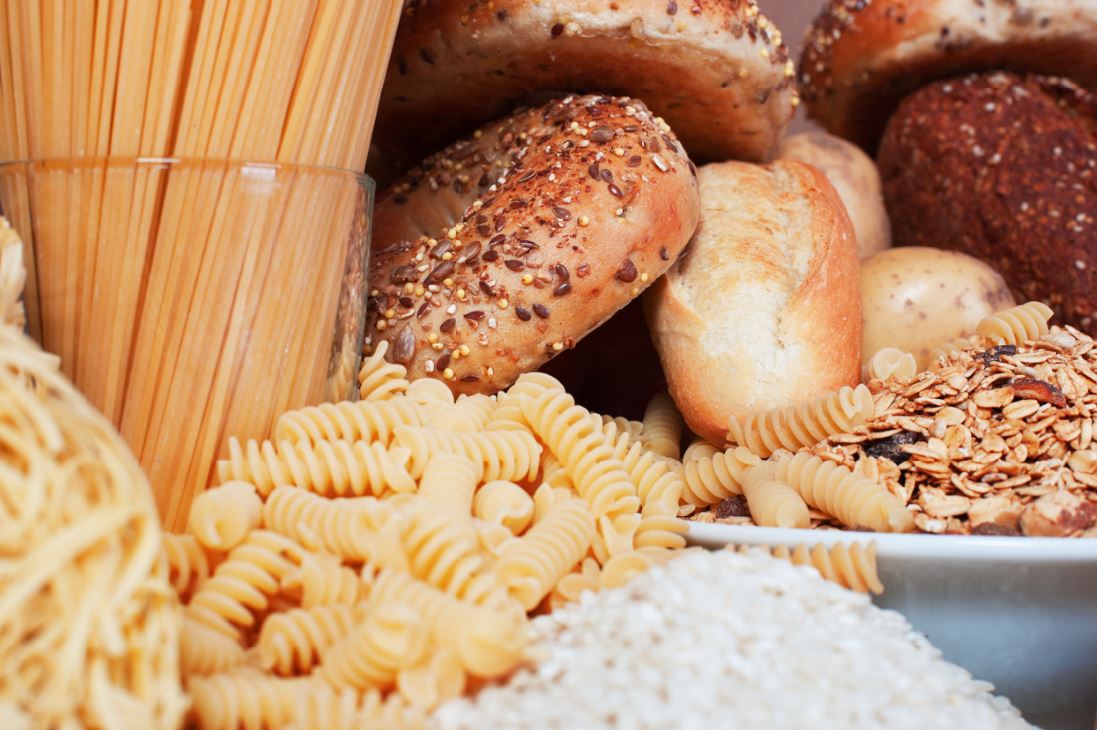Wondering why you’re always hungry? Nutritionist and Healthista Collective Expert Rick Hay explains 7 reasons why this may be the case and how to curb those hunger pangs
Ever asked yourself ‘why am I always so hungry?’ as you make your third trip to the fridge in the space of one hour…
Our bodies rely on food for energy, so it’s normal to feel hungry after a few hours without food.
In a bid to curb our hunger we often reach for the easiest snack we can get our hands on rather than eating a fulfilling meal.
The resulting ‘grab and go’ approach to eating and snacking has become a way of life and how we think we need to sustain our energy levels to get us through the day.
But if you rarely feel full and your stomach is constantly asking for more, there could be a number of reasons for this that go beyond just snacking on unfulfilling snacks.
More often than not, your excessive cravings can easily be beaten through some simple dietary changes. However, if you feel excessively hungry all the time, you might want to go and see your doctor to check that there are no underlying health issues.
Here are 7 possible reasons for your constant cravings…
#1 You aren’t getting enough sleep
When we don’t sleep well and are not fully rested, two important hormones – ghrelin and leptin – can be affected. The hunger hormone ghrelin will be increased and the appetite-supressing hormone leptin will be reduced.
These hormones are both responsible for letting us know when we are full up and when we are hungry. If these hormones aren’t sufficient we could end up feeling hungry even when we aren’t.
This will result in eating more than you need to as well as cravings, which certainly won’t help if weight loss is your goal. In addition, you are likely to eat more food to compensate for the fatigue and lethargy the following day.
Plenty of studies have shown that the less sleep you have, the more you eat. In fact, a study looking into whether sleep duration may be an important regulator of body weight and metabolism saw 1,024 volunteers report on their sleep habits through questionnaires and sleep diaries.
Fasted blood samples were evaluated too for leptin and ghrelin (the two key opposing hormones in appetite regulation).
The study found that participants with less sleep had reduced leptin and elevated ghrelin. The differences in the two hormones leptin and ghrelin were said to be a likely cause of increased appetite.
Plenty of studies have shown that the less sleep you have, the more you eat
The study noted that in Western societies, where chronic sleep restriction is common and food is widely available, changes in appetite regulatory hormones may contribute to obesity.
To stop your cravings you therefore need to look at improving your sleep hygiene, or finding ways to relax at the end of the day – a warm bath, reading a book, drinking a herbal tea, switching off gadgets such as your phone, computer of TV.
The mineral magnesium when taken before bed may also help with relaxation and improved sleep patterns as it can help to relax tight muscles.
Watch out for your sugar intake too. A diet high in stimulating sugary foods eaten during the day, may also contribute to sleep quality and lead to disrupted sleep.
#2 Your thyroid could be to blame
Thyroid disorders are actually very common and tend to occur more in women, although men, teenagers, children and babies can also be affected.
In fact, about one in 20 people have some sort of thyroid disorder, which they may not even be aware of.
The hormones made by the thyroid control your metabolism. For those who are unsure, the thyroid gland is an endocrine (hormone-releasing) gland found in your neck.
It produces two hormones that are secreted into our bloodstream, thyroxine (T4) and triiodothyronine (T3). These hormones are necessary for all the cells in our bodies to work normally.
The two hormones, T4 and T3 secreted by the thyroid gland influence the metabolism of your body cells. In other words, it regulates the speed with which your body cells work.
Thyroid disorders are actually very common and tend to occur more in women
These thyroid hormones control how quickly the body metabolises energy at a cellular level, and thyroid activity can alter your basal metabolic rate (BMR) by as much as 50 percent. Where energy is concerned, this can either ramp up your energy levels, or slow them down.
If your thyroid is working too hard and your energy levels are ramped up, you could suffer from hyperthyroidism, which accelerates your body’s metabolism, causing unintentional weight loss, an enormous appetite and irregular heartbeat.
It’s always worth getting your thyroid checked by your GP if you suspect that you may have thyroid issues. Natural treatment options include carnitine and selenium but as thyroid issues can be complex it’s best to get advice from a health care practitioner.
#3 You’re too stressed
Nowadays we are all busy. Busy checking emails, busy taking phone calls, busy taking care of the family, busy, busy, busy.
We are living in a stress epidemic (as well as a pandemic) and when we are chronically stressed our bodies feel as though they are under attack which leads to a fight or flight response being triggered in our bodies.
This causes the release of various hormones, including cortisol. Once the adrenaline from the stress has worn off, we will still have cortisol in our system.
Excess cortisol in our system means we may crave less healthy food options that contain higher sugar levels and fat content thus affecting your weight. Cortisol also increases your appetite and therefore you will feel more hungry when stressed – hence the term ‘stress eating’.
Excess cortisol in our system means we may crave less healthy food options
Don’t panic though (you’ll only increase those cortisol levels!) Simple solutions can be made daily to help you reduce your stress and hopefully your weight too.
Herbal remedies like lemon balm or St John’s Wort can help to support nervous system function and reduce stress levels. Lavender, tulsi, ashwagandha, B vitamins and/or a multivitamin supplement may also provide some stress relief.
As well as these natural remedies, try having 15 minutes of ‘me’ time everyday. This can involve reading a book or magazine, listening to an audiobook, watching your favourite TV programme or having a relaxing bath.
#4 You’re eating the wrong foods
Not all foods satisfy and satiate the body the same way.
The idea of filling up on rice, pasta and bread has long been thought of as a way to ensure you stay full after a meal.
However, refined carbohydrates like white rice, white pasta and white bread, have been through a manufacturing process that has removed all the nutritional goodness from the grains, leaving just the inner sugar part.
To curb your hunger, you should also be opting for foods high in protein, fibre and healthy fats
Once these refined grains reach your stomach, there is very little left for the digestive process to do and the sugar is quickly released into the blood stream. This leads to a sugar surge that is quickly followed by a sharp dip in blood sugars, triggering sugar cravings, closely followed by hunger pangs.
That’s why it’s important to replace these quick releasing white versions with more complex, wholegrain options, such as brown rice, brown pasta and wholemeal bread. Carbohydrate rich vegetables such as butternut squash or sweet potato, are more slow releasing carbohydrates, keeping you fuller for longer.
Vegetables in general also provide plenty of fibre and water content, helping you to stay fuller for longer. Ideally half your plate should be made up of vegetables.
To curb your hunger further, you should also be opting for foods high in protein, fibre and healthy fats (in moderation).
Protein is a complex nutrient and takes longer to break down during the digestive process. It therefore remains in your stomach for longer, keeping you full. Include good quality lean protein with each meal and snack such as turkey, eggs, tuna, beans, pulses, edamame beans and nut butter.
Ideally half your plate should be made up of vegetables
Plant based proteins like hemp, pea or rice when consumed as a smoothie using a plant based milk and a handful of berries are a great breakfast option which can help with satiety and weight management.
Studies show that consuming healthy fats increases satiety by working on the brain pathways that reduce the reward associated with food. As with protein, fats are also a complex nutrient, that require longer to break down and therefore remains in your stomach for longer.
Try and avoid sweets, cakes, white bread, and processed foods. Their nutrient density leaves a lot to be desired and they may harm the body if eaten too often and in big quantities.
#5 You’re dehydrated
It is not uncommon to confuse thirst for hunger. If you eat every three to four hours, and still feel hungry in between meals, you may actually be thirsty – not hungry.
Since we rely on many foods to provide water, when you are dehydrated your body can send out hunger signals, thereby increasing your appetite.
These deceiving hunger pangs cause you to mistake thirst for hunger, so if you’re feeling hungry, try drinking a glass of water or a cup of herbal tea in the first instance and see if you are satisfied.
when you are dehydrated your body can send out hunger signals
You’ve probably read this many times before, but you may be surprised how adequate hydration can help when it comes to reducing feelings of hunger.
Eating plenty of vegetables and fruit (max two per day) that are high in water such as melon, oranges, apples or cucumber will also maintain your hydration levels.
If you’re not one to drink plenty of water, you can top up hydration levels by drinking coconut water, herbal teas or vegetable, fruit juice combos. Be careful though, don’t substitute liquids for healthy eating and don’t drink so much that you feel uncomfortable or ill.
#6 You aren’t eating enough after exercise
When you exercise your body burns calories for fuel, meaning your body will be using more energy and your metabolism will be boosted. Generally, this will lead to an increased feeling of hunger.
Often though when embarking on a healthy eating regime we tend to drastically reduce our calories and limit our food intake in a bid to lose weight or fat.
However, in the long run this calorie reduction is unlikely to sustain your energy levels which will lead to constant feelings of hunger.
calorie reduction is unlikely to sustain your energy levels
The key then is to make sure you are eating healthy, nutritious and filling meals post exercise. Having them ready made will also mean you won’t reach for an unhealthy snack or junk food. It’s amazing how quickly you can demolish a packet of biscuits after a good workout, swim or run…
Plant based protein smoothies when consumed after exercise can help with building lean muscle mass as well as feelings of satiety.
#7 You have low blood sugar
Low blood sugar also known as Hypoglycemia means the glucose in your body drops to very low levels and for people with diabetes this is a common concern.
When blood sugar levels are too low, the cells become starved of energy which can lead to symptoms such as hunger or headaches.
To help balance your blood sugar aim to eat foods that are high in fibre
The key to steady blood sugar levels is healthy eating and smart snacking. That means you shouldn’t try and starve yourself all day for weight loss as this will lead to cravings and moodiness.
Plus, you need to snack smart with healthy pre-prepared snacks rather than those high in sugar or fat as these overly processed foods can cause blood sugar fluctuations.
To help balance your blood sugar aim to eat foods that are high in fibre such as vegetables, chickpeas, lentils, berries, nuts and seeds. Healthy plant based protein options like tofu and tempeh are also good for balancing blood sugar.
Rick Hay is an Anti-Ageing and Fitness Nutritionist with many years clinical experience in nutrition, naturopathy, botanical medicine and iridology.
He specializes in obesity treatment and weight management. He writes a regular Natural Health and Fitness Blog for Healthista.
Find out more at rickhay.co.uk.
Follow Rick on Twitter @rickhayuk
Relevant Healthista Content:
9 protein myths even smart women believe
9 protein food facts that will give you a better body
Do you need to add more plant-based protein to your diet?
Vegan protein pancakes PLUS 8 other protein powder recipes that AREN’T smoothies
Healthista Content You May Also Like:
3 short workouts for weight loss
8 weight loss tips proven by science
Like this article? Sign up to our newsletter to get more articles like this delivered straight to your inbox.


























































